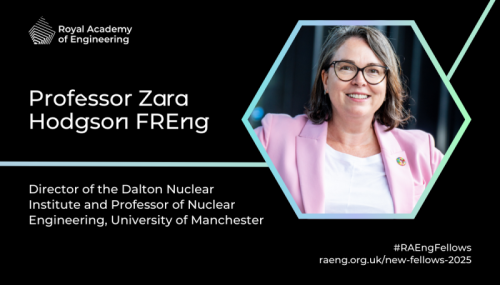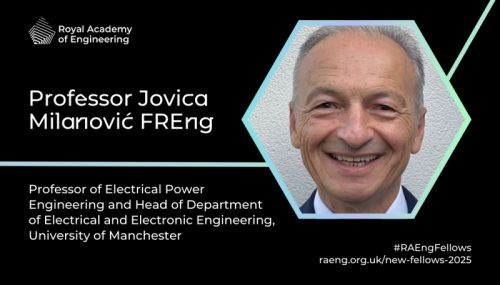�������Ƶ academics elected as Royal Academy of Engineering Fellows
Two University of �������Ƶ researchers are among the 74 leading figures elected by the to its Fellowship this year.
Professor Zara Hodgson and Professor Jovica Milanović have been elected for their exceptional contributions to their field: pioneering new innovations within academia and business, providing expert advice to government, and fostering a wider comprehension of engineering and technology.
 Zara Hodgson, Professor of Nuclear Engineering and Director of the Dalton Nuclear Institute at The University of �������Ƶ is an internationally renowned expert in nuclear energy policy and research. She has been pivotal in the UK government’s recent interventions to grow the UK’s nuclear fuel production capability, delivering advances for the global net-zero mission, and generating energy security by building resilient supply chains. Zara is the Director of the Dalton Nuclear Institute and a Professor of Nuclear Engineering at the University of �������Ƶ, where she is leading contributions to the national nuclear enterprise through high impact research, education, training and independent advice.
Zara Hodgson, Professor of Nuclear Engineering and Director of the Dalton Nuclear Institute at The University of �������Ƶ is an internationally renowned expert in nuclear energy policy and research. She has been pivotal in the UK government’s recent interventions to grow the UK’s nuclear fuel production capability, delivering advances for the global net-zero mission, and generating energy security by building resilient supply chains. Zara is the Director of the Dalton Nuclear Institute and a Professor of Nuclear Engineering at the University of �������Ƶ, where she is leading contributions to the national nuclear enterprise through high impact research, education, training and independent advice.
“I am just thrilled to be elected as a Fellow of the Royal Academy of Engineering; joining Jovica and 72 other leading figures, I am proud to represent �������Ƶ and the nuclear energy sector."
 Jovica Milanović, Professor of Electrical Power Engineering at The University of �������Ƶ is internationally recognised for his outstanding contributions to power systems engineering. His research focuses on the probabilistic modelling of power system dynamics, addressing uncertainties in generation, demand, and network topology, and advancing distributed voltage control strategies. He has played a pivotal role in shaping industrial standards through leadership in IEEE and CIGRE task forces, and his work on load modelling has been instrumental in improving peak demand management across UK networks. Professor Milanović also holds leadership positions within the IEEE and senior advisory roles in the electrical power industry.
Jovica Milanović, Professor of Electrical Power Engineering at The University of �������Ƶ is internationally recognised for his outstanding contributions to power systems engineering. His research focuses on the probabilistic modelling of power system dynamics, addressing uncertainties in generation, demand, and network topology, and advancing distributed voltage control strategies. He has played a pivotal role in shaping industrial standards through leadership in IEEE and CIGRE task forces, and his work on load modelling has been instrumental in improving peak demand management across UK networks. Professor Milanović also holds leadership positions within the IEEE and senior advisory roles in the electrical power industry.
“I am delighted to be elected Fellow of the Royal Academy of Engineering. I see it not only as my personal highest career achievement, that I am very proud of, but also as a credit to an excellent applied and theoretical research that our Power Systems Group and more generally Department of Electrical and Electronic Engineering have been doing for many years. Having two of us from The University of �������Ƶ, Zara and me, elected in the same year, is also a huge credit to engineering excellence in the field of Energy that our School of Engineering is fostering.”
The new Fellows will be formally admitted to the Academy at a special ceremony in London on 18 November, when each Fellow will sign the roll book. In joining the Fellowship, they will lend their unique capabilities to achieving the Academy’s overarching strategic goal to engineer better lives.
The group consists of 60 Fellows, nine International Fellows and five Honorary Fellows.They are drawn from every specialism from within the engineering and technology professions and cover sectors ranging from energy and defence to new materials.
Sir John Lazar CBE FREng, President of the Royal Academy of Engineering, said: “As we approach our 50th anniversary next year it’s a good time to reflect on how much we have achieved. The Academy is built on the foundation of our Fellowship, and that remains as true today as half a century ago. Our story began as a ‘Fellowship of Engineering’ of 130 Fellows including such pioneers as Air Commodore Sir Frank Whittle, Lord Hinton of Bankside and Sir Ove Arup, driven by the support of HRH The Prince Philip, Duke of Edinburgh.
“Today’s cohort join a community of around 1,700 of some of the most talented engineers and innovators in the UK and around the globe. Their knowledge and experience make them uniquely well placed to tackle the biggest challenges facing the world, and our determination to advance and promote excellence in engineering remains undimmed.”
Further information about the new Fellows can be found on the